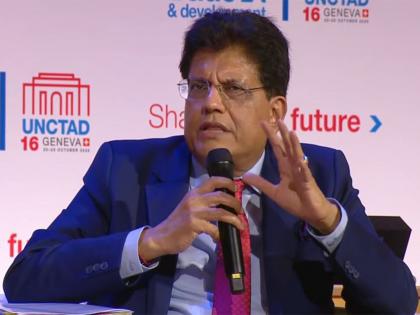India addressing supply chain vulnerabilities through Atmanirbhar agenda: Piyush Goyal at UNCTAD roundtable
By ANI | Updated: October 22, 2025 16:10 IST2025-10-22T16:08:09+5:302025-10-22T16:10:03+5:30
Geneva [Switzerland], October 22 : Union Minister for Commerce and Industry said India chose the path of "Atmanirbharta", or ...

India addressing supply chain vulnerabilities through Atmanirbhar agenda: Piyush Goyal at UNCTAD roundtable
Geneva [Switzerland], October 22 : Union Minister for Commerce and Industry said India chose the path of "Atmanirbharta", or self-reliance, to tackle vulnerabilities exposed in global supply chains, emphasising that resilience and trust have, in a way, now taken precedence over cost efficiency.
"We realise that we'll have to rethink our supply chains," the minister said, underlining the government's strategic shift in policy. He was addressing the UNCTAD (UN Trade and Development) Ministerial Roundtable on 'Towards Resilient, Sustainable, and Inclusive Supply Chains and Trade Logistics'.
"India has launched a massive programme called Atma Nirbhar Bharat. That's a self-reliant India," he added.
He explained that the government has been reviewing every sectoral supply chain "to see where our vulnerabilities are, where we need to expand capacity, even though it may not be adhering to Michael Porter's theory of the comparative advantage of nations."
"We are willing to pay that extra buck to be able to have resilience in our supply chains," he said, noting that the approach has helped create jobs, helped create production capacities within the country.
Wherever India found "concentration of production or concentration of supply from any geography," he said, "that has been the area where we've looked at self-reliance."
The minister acknowledged that certain global challengeslike geopolitical tensions or pandemicsremain beyond one's control.
"Clearly, we can't do anything about what's happening in the Red Sea or about these health pandemics. But self-reliance, we realised, was important, for example, in vaccines," he said, recalling how India quickly ramped up systems, developed its own Covid vaccine.
However, he noted that even as it wants to become self-reliant, "we still needed equipment, and we still needed components from all over the world, which is where we started expanding our free trade agreements, expanding trading relations with friendly countries."
"Therefore, we placed trust and reliability at a bigger foothold than just cost," he said.
India, he pointed out, is the fastest-growing large economy in the world today, doubling its economy every eight years.
"We are very confident that going forward, India will continue to remain the fastest growing large economy to meet the needs of a substantial population of 1.4 billion people," he added.
"We have a huge network of rail, road, and inland waterways on which we are investing amounts of money to serve both the passenger needs and the transport logistics," he added, highlighting, "Our idea is that we have a very strong internal transport network, create the infrastructure to promote local industry, local self-reliant manufacturing systems."
Looking outward, he said, India seeks "trusted partners" and believes that cooperation among developing nations will be crucial for global progress.
"I think large parts of the less developed world or the developing world will have to work in cooperation and collaboration," the minister said. "We'll have to build up more conversations amongst ourselves. We'll have to learn from each other's examples, share our own offerings."
He pointed to India's leadership in digital innovations.
"We have some very good digital offerings, for example, on payment systems. If we all share it amongst each other, we can significantly bring down the cost of transacting and payment within countries," he suggested during his brief address.
Disclaimer: This post has been auto-published from an agency feed without any modifications to the text and has not been reviewed by an editor
Open in app